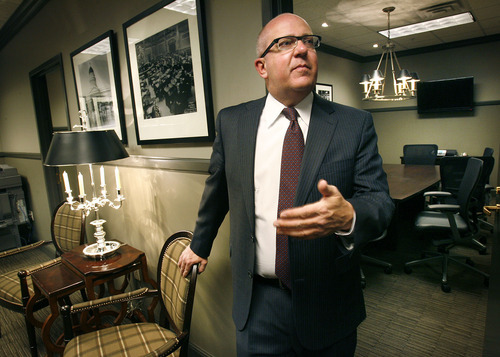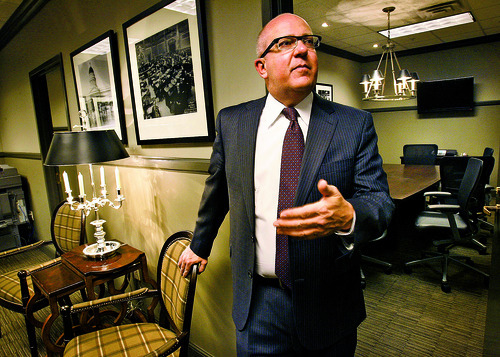This is an archived article that was published on sltrib.com in 2010, and information in the article may be outdated. It is provided only for personal research purposes and may not be reprinted.
Senator-elect Mike Lee has tapped one of Utah's most prominent lobbyists to lead his Washington staff and coordinate his transition from candidate to senator.
Spencer Stokes doesn't officially become a Senate staffer until Jan. 5, but he plans to bounce between Utah and Washington in the coming weeks as he tries to hire staff, set up the Senate office and ramp down his lobbying activities.
"It will be an exciting time to be back in D.C.," said Stokes, who believes American voters used November's election to protest government overreach. He said Republicans are now positioned to make an impact on areas that are important to him and his new boss. "I have similar beliefs and views on the federal debt, the deficit, the federal government getting too big."
Lee commended Stokes on his government experience and understanding of Utah issues.
"He has an encyclopedic knowledge of Utah politics," Lee said. "He has a good strategic mind and I like him"
Lee said they first got to know each other when he was working as former Gov. Jon Huntsman Jr.'s legal counsel and Stokes was a constant presence on Capitol Hill.
The two also briefly collaborated for 1-800-Contacts, with Stokes acting as the company's lobbyist and Lee as its attorney. They have also both worked for EnergySolutions and Stokes is still registered to lobby for the nuclear services company, which operates a radioactive waste landfill in Utah.
Stokes is currently registered to lobby for 18 organizations in the state, including the Utah League of Credit Unions; Management & Training Corp., a private prison company; and a number of energy interests, including utilities and the Utah Association of Energy Users.
On the federal level, Stokes has primarily lobbied for Weber County, Weber State University and a small defense contractor, Engineering and Software Systems Solutions, for which he focused on federal funding and earmarks.
Lee made a campaign promise to forgo any earmarks for his first year in office and has been highly critical of the practice in which lawmakers funnel federal money to pet projects back home.
Stokes said he talked to Lee about this before accepting the job.
"I completely understand his position, and I share it," Stokes said. "There's got to be some reform and I am hoping we can be leaders in that."
Lee argued that Stokes' knowledge of the federal appropriations process will help him push for change.
"When playing one side, it helps to know the other side and to have been there in the past," he said.
Stokes also said his lobbying relationships have given him insight into key policy areas, including transportation, corrections and health care.
"I know a lot about those industries that I represent," he said. "I will approach this in a fashion that is honorable and with integrity. My clients will do it the same way. They understand the relationship and know it has changed now."
Craig Holman, of the Washington, D.C.-based watchdog group Public Citizen, has been a longtime critic of lobbyists joining the government and government officials becoming lobbyists, a practice referred to as the "revolving door."
"This is one of the primary tools for what I consider undue influence peddling on Capitol Hill and throughout Washington," Holman said. "In essence, it enables special interests that were represented by a former lobbyist to essentially capture governments."
Despite such criticisms, it's common for members of Congress to tap someone with lobbying experience to lead their offices.
Sen. Orrin Hatch, R-Utah, recently named Michael Kennedy as his new chief of staff. Kennedy was a Washington lobbyist before leading Utah State University's government relations' efforts. Last year, Rep. Jim Matheson, D-Utah, hired a chief of staff who was a registered lobbyist for AT&T.
And on the flip side, outgoing chiefs of staff often become lobbyists. Hatch's departing chief of staff, Jace Johnson, is leaving to become a lobbyist for Adobe. Matheson's longtime top aide, Stacey Alexander, joined a small lobbying firm with clients such as Time Warner and Goldman Sachs.
Before becoming a lobbyist in 1999, Stokes served as the executive director of the Utah Republican Party, at a time when Rep. Rob Bishop, R-Utah, was the party's chairman. He remains close to the congressman. In 1994, Stokes served as chairman of the Weber County Commission.
Lee also named David Barlow as his chief counsel Thursday. Barlow, a Yale and BYU graduate, is a partner at the law firm Sidley Austin. Lee calls him "simply brilliant" and plans to lean on him to vet judicial nominations.
Revolving door
It is common practice for Congress members to hire lobbyists as staffers and, conversely, for congressional staff to leave government employment to lobby for industry. Critics say it forms a close, unhealthy alliance between government and special interests. Defenders say it makes sense because lobbyists have valuable knowledge about issues and how government works.





